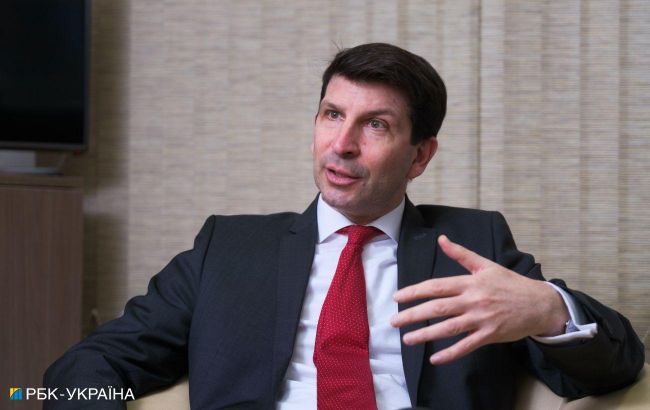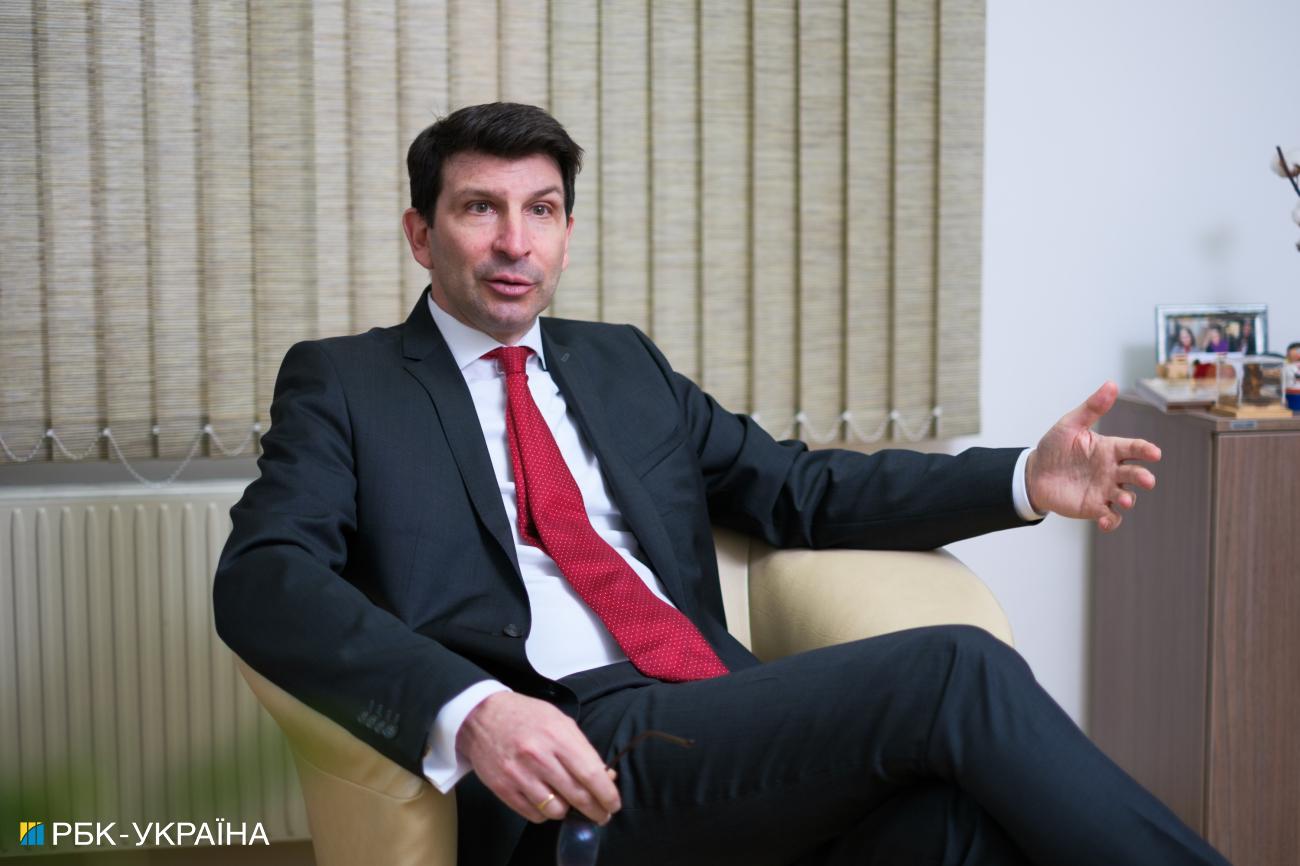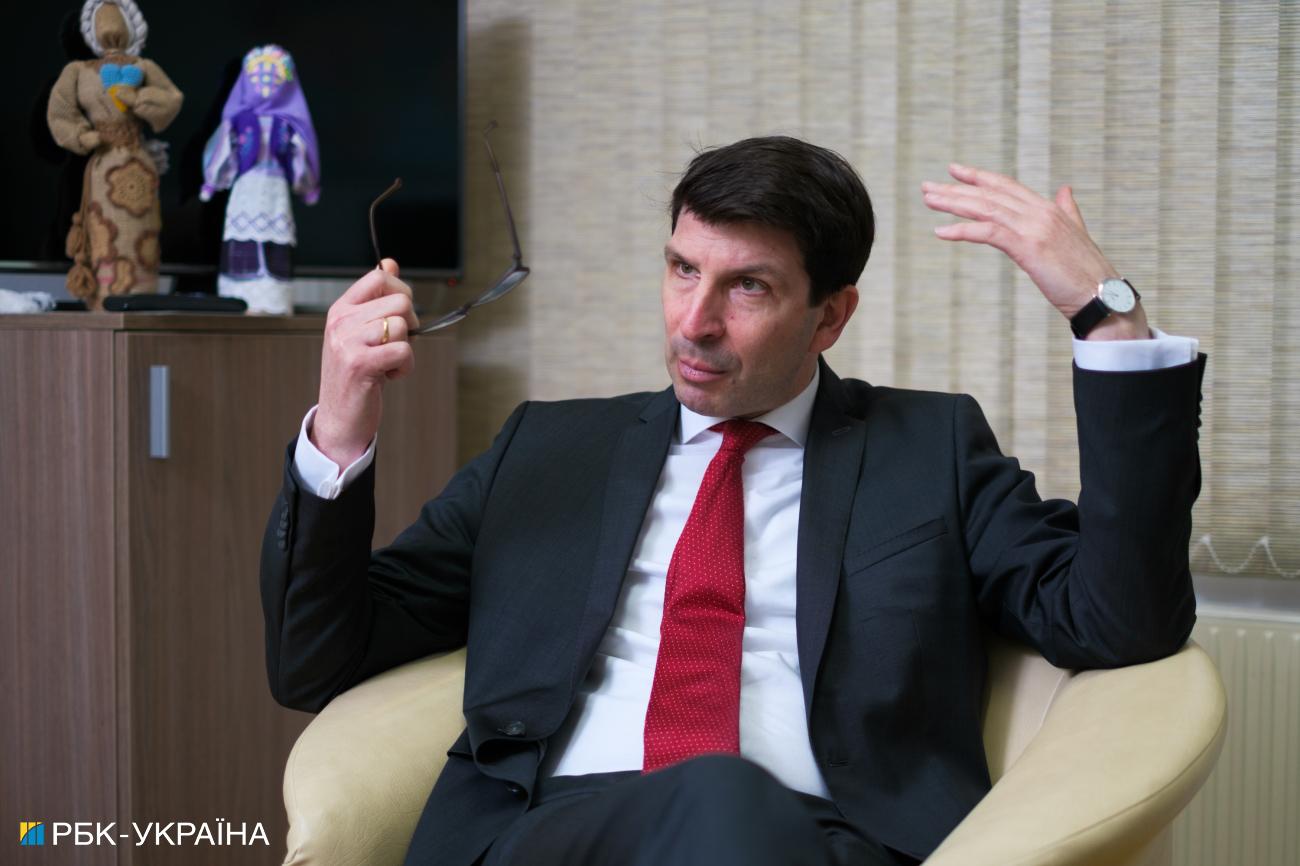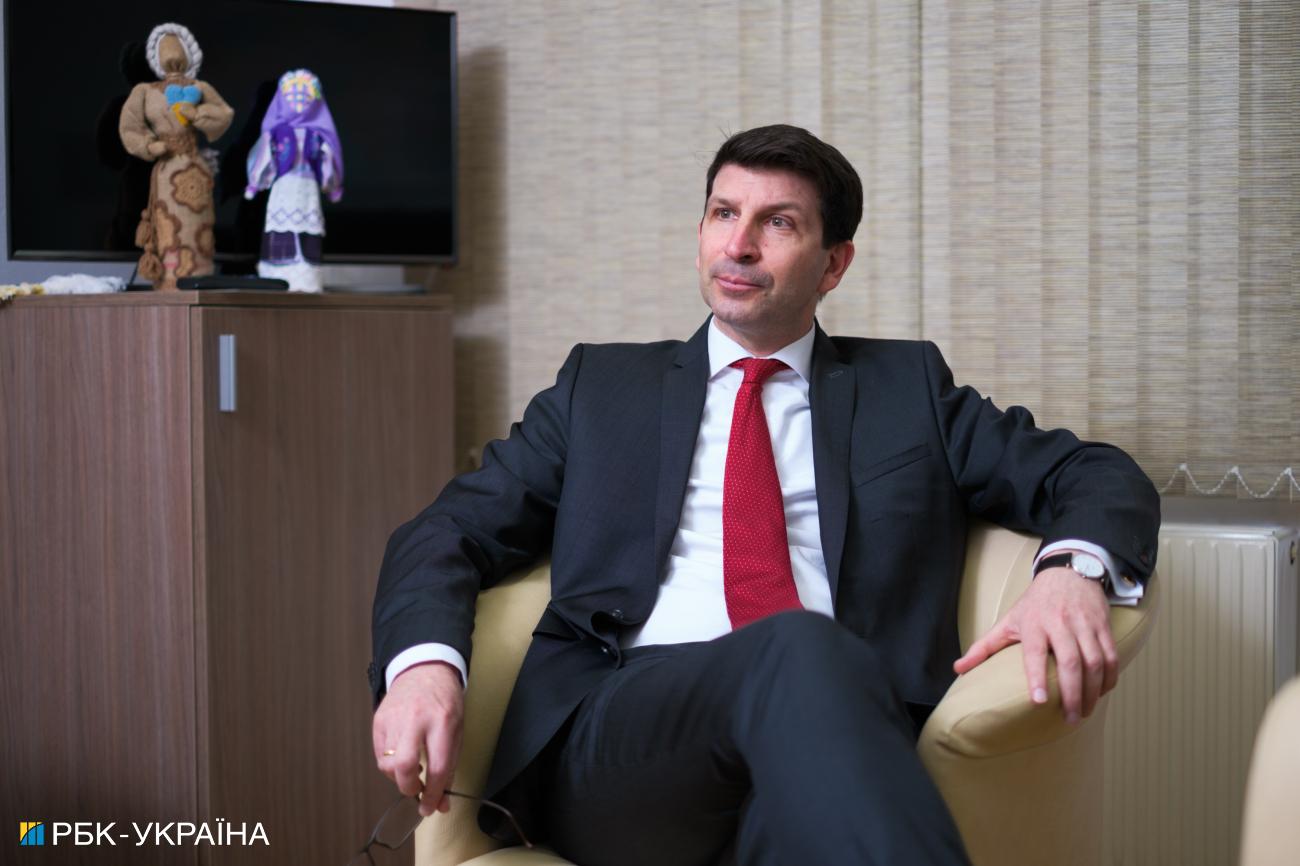Austrian Ambassador Arad Benkö: Peace negotiations should not take place behind Ukraine's back
 Austrian Ambassador to Ukraine Arad Benkö (all photos: Vitalii Nosach/RBC-Ukraine)
Austrian Ambassador to Ukraine Arad Benkö (all photos: Vitalii Nosach/RBC-Ukraine)
In an interview with RBC-Ukraine, Austrian Ambassador to Ukraine Arad Benkö talked about how the government coalition could affect Austria's policy towards Ukraine, Vienna's vision of peace talks on Ukraine, and the involvement of Europeans, as well as Austrian aid to Ukrainian refugees.
Unlike most of its neighboring countries, Austria is not a NATO member, although it is a member of the European Union. “We are militarily neutral but not politically neutral. Politically, we stand on the side of Ukraine in solidarity with our European partner member states in the EU,” Arad Benkö, Ambassador Extraordinary and Plenipotentiary of Austria to Kyiv, assures RBC-Ukraine. The diplomat goes on to detail the kind of assistance his country, individual cities, and organizations provide to Ukraine: humanitarian, economic, and financial.
He assures that the country will continue to support Ukraine after forming a new government, which has been delayed for several months.
In the conversation with the ambassador, RBC-Ukraine also mentioned the key international topic of recent weeks - negotiations to end the war in Ukraine. “Ukraine must be involved, the EU must be involved,” Benkö says, adding that his country with a neutral status is ready to act as a platform for any negotiations.
– What should Ukraine expect from coalition negotiations in Austria? Do you see any dangers for Ukraine?
– Austria has supported Ukraine in full solidarity since the 24th of February 2022. And we will continue to do so. Of course, I don't know exactly how the incoming new government´s foreign policy will look like but there is a pro-European understanding in Austria which is shared by most Austrians.
Austria enjoys many benefits from the European Union and Austria votes in foreign policy in accordance with national interests and in a pro-European spirit. All in all, I don't foresee a wavering in our policy for Ukraine and it is quite clear that there is a societal majority to support Ukraine which is the clear victim in Russia´s unprovoked war against Ukraine.
– So, all in all, Austria's policy under the possible new government will remain basically the same, will remain consistent, won't it?
– The pillars of Austrian foreign policy are based on the fundamental values of democracy, the rule of law and the protection of human rights. International law and the UN Charter form the basis of our international engagement, we will continue to advocate unequivocally for the rules-based international order. And this applies of course also to Russia´s war of aggression against Ukraine.

– In the EU we used to have Hungary as a source of permanent dissatisfaction about any pro-Ukrainian moves by the EU. Now it is joined by Slovakia. Is there a risk that Austria may become the third in the club?
– Of course, Austria shares a long common history with Hungary and Slovakia but there are some reasons why a comparison is difficult. One is that we are a federal state which means that our provinces – the Länder – have considerable powers too. Second, the social partnership. We have very strong interest groups that look for a balance between the employers and the employees and have successfully contributed to enjoy social peace in Austria.
In spite of polarization in Europe and elsewhere they continue to work together very well together. Thus, the regional dimension and the social partnership ensure stability in the system. Also, we are net payers in the EU and very much aware of how responsible policies can be negotiated and supported in Brussels.
– And how actively was the topic of the Russo-Ukrainian war discussed in Austria in media, among the people, among the politicians during the parliamentary election campaign?
– All parties in the Parliament agree that Russia is the aggressor. And Ukraine has been invaded in a full-scale war which is by no means legitimate.
The issue of Russia's war against Ukraine has not been very strong in the election campaign because there the focus laid on social issues, high inflation and the resulting loss of purchasing power for citizens, illegal migration, or challenges in the health sector.
– You said that there is no consensus on how to get out of the war in Ukraine. But as everyone sees, during the last months and especially last weeks there are much more talks than before about some peace negotiations or 'making a deal' as US President Trump puts it. So, all these prospects for any sort of peace negotiations – how are they seen in Austria or from Austrian perspective?
– For us, it's pretty clear that one thing, and that is that peace negotiations should not take place without Ukraine or behind Ukraine's back.
It is clear that Ukraine fights for its independence very bravely. No one would have expected that almost three years after we could still sit in democratic Ukraine. And this is our basis, this is our orientation, that Ukraine has to decide when the time is right to make compromises, and compromises are always very hurtful.
Our position is, of course, that we are respecting the full sovereignty and integrity of Ukraine in the borders of 1991. But there's of course also the reality check, the situation on the ground, and what death and destruction mean for many families on the frontline, in central Ukraine and even abroad: loss of life, loss of property, loss of perspective.
We have a political commitment that we will support Ukraine for as long as it takes. And we have spent almost 300 million euros in bilateral aid, humanitarian, economic, and financial.
– But not military, am I right?
– Not military. Let me underline that we are militarily neutral but not politically neutral. Politically, we stand on the side of Ukraine in solidarity with our European partner member states in the EU.
– President Zelenskyy said recently that Ukraine is close to peace like never before. Do you have such a feeling? Do you share this point of view?
– Well, I'm here now for thirty-three months, since 2 May 2022. I remember that when we had our first briefing in the conference room - and we had them every day for the first couple of months - we saw the front moving faster than now, we didn't know in what surroundings we would be sitting in September 2022. And then in September 2022, you managed to recapture the Kharkiv region, a large territory.
So my take is that the predictions are very difficult to make and surprises and unexpected developments can never be excluded.
However, I understand that so many people have losses, so many people have lost family members, by injuries or even deaths. The whole nation is traumatized with attacks at night and during the day. On the 10th of October 2022, missiles landed just 450 meters from here on Shevchenko Street and the whole building was shaking. What I also learned to value is the ingenuity of Ukrainians, the stamina of Ukrainians, something that Europe can learn a lot from.
But as for the negotiations, there are ongoing talks between the Americans and the Russians. As I said before, Ukraine must be involved, the EU must be involved. And Austria, as a neutral country, has offered its good services as a host of negotiations between parties involved. It's important to point out that Austria is also a seat of 52 international organizations including 18 UN organizations.
– That was just my next question. So what role can Austria play in particular due to its neutral geopolitical status in these negotiations? Just be the venue of potential talks?
– When then Chancellor Karl Nehammer met President Zelenskyy in mid-December they discussed intensifying joint efforts to achieve a comprehensive, just, and lasting peace. Chancellor Nehammer emphasized that as the capital of a neutral country, Vienna is always ready to host future peace talks. We had a summit between Brezhnev and Carter in 1979 and Kennedy and Khrushchev in 1961.

As the seat of numerous international organizations, Austria's foreign policy stands for dialogue and responsibility. Austria is the headquarters of the IAEA, which is dealing with nuclear energy but there are more organizations in Vienna dealing with that issue like the EU´s energy community. So energy is one issue amongst many that could be discussed.
In any case, the Europeans should have a seat at the negotiating table – not only because we are the biggest donors but because Ukraine is a European country fighting for our values and freedom. Austria is ready and willing to help in the reconstruction of Ukraine. We have here a lot of Austrian businesses that are investing and almost all of them are still in the country.
– Let's get to the Austrian aid to Ukraine. What has been done so far and what are the plans for some foreseeable future? And a more general question: in your opinion, can the European Union potentially take US place as a key donor to Ukraine as the US is reducing its foreign aid in general?
– In total, Austria has spent around almost 300 million euros of bilateral aid. Then there is also the aid from the EU, divided between countries according to their GDP. The Austrian part of the EU's GDP is 2.8%. In 2022 Austrian support was mostly focused on humanitarian aid, refurbishing destroyed houses, delivering water, hygiene articles and food or cash assistance, and so on.
In 2023 we started to diversify. One direction is financial support programs (short-term for maintaining basic services and infrastructure; long-term for reconstruction). Another one are various forms of support like for anti-corruption, forensics, art, culture and sport, nuclear safety, international law enforcement, gender equality, protection of journalists, air traffic control, etc.
In the humanitarian field the variety of our support is impressive: via the Red Cross so-called mobile health units are employed. These are emergency vehicles that go through small villages with a doctor and a nurse inside. They go to old people who are alone, they don't want to emigrate, they have their house, where they've always lived. And so they bring them something to eat, hygiene articles and they check if they need medication and they chat with them because this is also what they need.
Another point is psychosocial support, which has increased, especially from mid-2023. This ranges from Caritas, which gives help to handicapped people, to a program that our education officer does, training the teachers, to help teachers learn how to deal with trauma of children.
In many places, social centers are being run by international organizations like UNICEF, UNFPA, UNHCR, or Austrian NGOs that are implementing them. They all have different names, but they are all doing the same. Usually, it's a help point, a center, where you get psychosocial support, where you get support with legal aid if your documents have been destroyed because you come from occupied territory. You usually have a place of recreation for young people, for older ones. It's heated, so people that have no electricity can warm up, meet each other.
Then there are generators, emergency vehicles, school buses, minivans, firetrucks that are brought to Ukraine with the help of the State, the regions, communities, the business sector, or private initiatives. The city of Vienna for instance has brought a big hospital bed for Ukrainian hospitals, other cities sent medical instruments that help save Ukrainian lives. Others concentrate on sending laptops, PCs, school furniture for kids to improve their learning.
Last not least, we also support different Ukrainian initiatives: the Grain from Ukraine, an initiative to buy Ukrainian grain and bring it to poor countries like Yemen, Somalia, South Sudan, etc. Also, a sizable amount has been dedicated to humanitarian demining, which is necessary, especially in the east, in the de-occupied territories but not only.
– Is there any internal pressure inside your country when people say: why do we spend all these millions and millions for Ukraine instead of spending them here, at home?
– Not so much. Most support is being spent with the help of UN organizations or Austrian NGOs. Visibility is relatively low, I find that sometimes a bit unfortunate because I would like Ukrainian public to know what we do. All political parties agree that in the humanitarian field, it is absolutely important and legitimate to support Ukraine.
– How many of Ukrainian refugees live in Austria and what is the policy that your government is pursuing towards them? Do they want our people to remain there or do they gently push them to come back to Ukraine after the war is over? And are any changes expected after the new government is formed?
– The temporary protection status of Ukrainians in Austria has been prolonged until March 2026. So any Ukrainian that arrives in Austria can ask for temporary protection because full-scale war is still going on. We have around 85,000 Ukrainian refugees in Austria. As far as I know, around 30 percent of them have jobs. In the meantime, many of them have learned German. A high percentage are women and children.

It is a fact that Ukrainians integrate much faster than refugees from other countries. Ukrainian refugees enter the labor market relatively quickly and they send their children to school. Actually, to two schools, from Monday to Friday to an Austrian school, which is compulsory, And on Saturday, many Ukrainian children go to the Ukrainian school to learn the Ukrainian language and Ukrainian history. I think that this is very important that they continue this because in order to speak German well, you also should speak your mother language well.
– There was a big scandal recently as the Russian department of the Raiffaisen Bank was reported to be the most profitable in the whole concern. And moreover, this department is working with the Russian military industry complex very closely. Almost two years ago the CEOs of the whole Raiffaisen group promised to reduce its activities in Russia or even to sell the business in Russia. But as we see, something opposite happens. So what can be done about this? What is the Austrian government's stance about this?
– Well, the case of RBI or other international companies active in Russia is a very sensible one. RBI is a private company. It is known that they have substantially reduced their activities on the Russian market and have announced that they will continue to do so.

